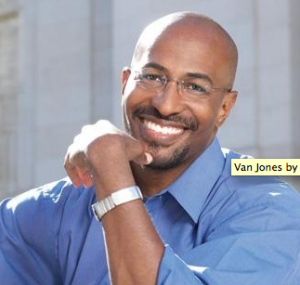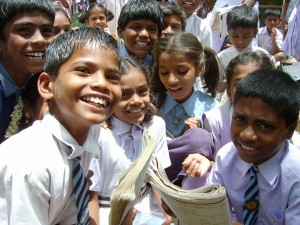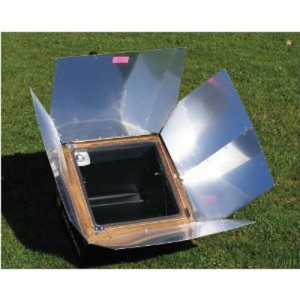Solar Electric Light Fund Launches “Energy is a Human Right” Campaign
 The Solar Electric Light Fund (SELF), a Washington, D.C.-based nonprofit working to eliminate energy poverty through the use of solar power, today announced that it is launching “Energy is a Human Right,” a campaign to provide a voice to the nearly 1.5 billion people around the world living without access to electricity and other forms of modern energy. It is also calling upon the international development community and general public to join the campaign by visiting www.EnergyIsAHumanRight.com to show their support for those living in energy poverty, and to learn how they can help provide energy access to assist in their economic, education, health and agricultural development.
The Solar Electric Light Fund (SELF), a Washington, D.C.-based nonprofit working to eliminate energy poverty through the use of solar power, today announced that it is launching “Energy is a Human Right,” a campaign to provide a voice to the nearly 1.5 billion people around the world living without access to electricity and other forms of modern energy. It is also calling upon the international development community and general public to join the campaign by visiting www.EnergyIsAHumanRight.com to show their support for those living in energy poverty, and to learn how they can help provide energy access to assist in their economic, education, health and agricultural development.
“For the last 15 years, SELF has always believed and said that energy is essential for life,” says Bob Freling, Executive Director, SELF. “Access to energy is foundational to achieving a broad range of basic human rights and all of the Millennium Development Goals. Without it, life is very, very difficult as I’m sure 1.5 billion people can attest to.”
Through its Whole Village development model, SELF works hand-in-hand with communities to create and implement innovative solar energy solutions to improve people’s health and education, ensure food and water security, and spur economic development. Recently, it made a commitment to the United Nation’s Sustainable Energy for All Initiative to continue scaling up this model in Benin, West Africa by installing solar systems to power water systems, schools, health clinics, community centers, and street and household lighting systems. Mr. Freling is also co-chairing the initiative’s Working Group on Energy and Health, which will be examining ways to provide access to renewable energy sources for hospitals and health care clinics to support medical services.
“We proudly support the U.N. initiative and look forward to closely working with them to provide universal access to energy to those in need,” says Freling. “Our hope in launching this human rights campaign is to call attention to the critical role energy can play in helping people lift themselves out of poverty and create a better life.”
Van Jones Kicks off American Dream Movement with Energetic Rally and Speech at NYC’s Town Hall
 By Jason Abbruzzese, AlterNet:
With the star-studded accompaniment of Shepard Fairey and The Roots, activist Van Jones kicked off the “American Dream Movement” campaign with an event that was one part TED Talk and one part concert.
By Jason Abbruzzese, AlterNet:
With the star-studded accompaniment of Shepard Fairey and The Roots, activist Van Jones kicked off the “American Dream Movement” campaign with an event that was one part TED Talk and one part concert.
Presented with help from MoveOn.org and other organizations, the event was billed as an attempt to bring together the progressive movement under a united front.
Jones’s message centered on the economy and the dangerous rhetoric coming from the American right.
“We are being lied to” Jones said. “We know that we cannot solve the problems our country is facing while continually and continuously being lied.”
Jones, the former Special Advisor for Green Jobs to the Obama White House, drove home the message that misinformation is preventing America from rebuilding the economy, and that confronting these lies is paramount to moving forward.
Jones focused on what he called the four big lies. Lie number one: America is broke.
“We are not broke and we are not alone,” Jones said. “If we’re still the richest country in the world, why are so many American suffering right now?”
Jones, backed by a large-screen presentation, took the audience through America’s economy, the financial collapse, and the aftermath.
He likened telling America that it is broke to telling people in a burning building that all the exits are locked when they’re not.
Jones pulled no punches in addressing the need to hold Wall Street and America’s richest citizens accountable for their share of taxes, but stressed the need to make sure that any plans encourage jog growth.
“Nothing stops a bullet like a job,” Jones said.
Jones moved on to lie number two: Asking the super rich to pay taxes hurts the economy.
“You do well in America, you should do well by America,” Jones said.
He also stressed that he was not anti-business, but targeting multi-national corporations that paid no taxes but constantly asked for more from the American people and the US government.
“Corporate America would be the worst boyfriend ever,” he said.
As part of the presentation, the audience was shown a brief clip of millionaires who support increased taxes, which can be found at www.patrioticmillionaires.org.
The legacy of the post-depression generation, which helped build a strong middle class through good government, good employers, and good citizens, was his next topic: “We let them down,” Jones said.
Next, lie number three: Hating America’s government and wrecking America’s infrastructure is patriotic. Jones directly addressed the work of the Tea Party and the Rand Paul budget.
“Real patriotism is defending our infrastructure from all enemies – foreign and domestic,” he said. “We need right now a movement for a patriotism deeper than that.”
Lastly, lie number four: That we’re helpless.
Jones noted that while the Tea Party was able to rally 150,000 people in Washington DC, there were 150,000 people in the streets of Madison alone, along with marches in New York and other parts of the country.
Although Jones did not address his former boss by name, he did discuss some frustrations that progressives have had with President Obama. “Our slogan was never ‘Yes he can,’” Jones said. “It is ‘Yes we can.’”
Jones wrapped up his talk by proposing a series of measures aimed at the economy, and discussing the details of the Contract for the American Dream.
The first proposition was what Jones called a “gambling tax on Wall Street,” which would take 1/10 of one cent for each stock trade. With a tremendous amount of modern stock trading being done through computers, Jones lauded this as an easy way to tax Wall Street while not actively discouraging business.
“How do you discourage an algorithm?” Jones joked.
He added that he is seeking a rollback of the Bush tax cuts, the recall of US troops in Afghanistan and Iraq, and the elimination of oil subsidies.
But Jones saved his most ambitious plan for last. Starting on July 5th, RebuildtheDream.com will be asking American to suggest their ideas to help restore the American Dream. This will be followed by meetings on June 16th and 17th in every congressional district to discuss the submitted ideas and put forward the best.
From these ideas, Jones hopes to make a “Contract for the American Dream,” which will be the cornerstone of the “American Dream Movement.”
The event was broadcast live across the internet, including on AlterNet and various other sites. You can find more information at www.rebuildthedream.com.
Clean Energy to Generate Millions of Green Jobs in India
 By Shah Jigar: ‘Save the Planet’, ‘Keep the City Clean and Green’, and ‘Stop Global Warming’ are oft-heard slogans, and a large number of people from different parts of the world are working hard to stop pollution and make the world a better place to live in. Do you belong to the green brigade? Would you like to make a positive contribution to the world you live in? Indians have a reason to rejoice as over a million green jobs will be created in the country by 2012.
By Shah Jigar: ‘Save the Planet’, ‘Keep the City Clean and Green’, and ‘Stop Global Warming’ are oft-heard slogans, and a large number of people from different parts of the world are working hard to stop pollution and make the world a better place to live in. Do you belong to the green brigade? Would you like to make a positive contribution to the world you live in? Indians have a reason to rejoice as over a million green jobs will be created in the country by 2012.
Governments across the world, including the US Government, are planning to invest more in cleaner forms of energy. This step will include investment in technologies for renewable energy. The environmental think tank, The Climate Group, in a report titled India’s Clean Revolution, says that India has great capacity to develop and benefit from the use of green technologies. And it also says that for this transition to new and cleaner sources of energy, the country will have to develop people with a new set of skills: which means that a lot of green jobs in India are on the horizon.
Green jobs in India could overlap with other professions: architects capable of designing green buildings, civil engineers capable of making environment-friendly infrastructure, organic farmers, etc. India will need a lot of professionals and trained people to take care of and expand its solar energy, wind power and turbine facilities. The country is, even at the present point of time, facing shortage of experts in these fields. In an interview, CEO of Green Infra, Sunil Jain, had said that, “The forecast of 10.5 million jobs by the end of the decade is a figure on the high side but one we can definitely achieve.”
As the dependence on oil as the main source of energy grows weaker, other forms of energy will need to compensate for its decreasing use, and this will create tremendous opportunity in the world of green energy. If you are at the threshold of your career or if you feel the need to make change your work profile, educational or experiential qualifications in the field of clean and green energy will help you get green jobs in India a few months down the line.
The Indian Government has been investing heavily in education and research since the last few years and thankfully there is a good workforce of scientist and engineers who can lead the country on its way to becoming cleaner and greener. The wind sector is expected to generate around 150,000 to 250,000 jobs in India, while solar industry has the potential to create 117,000 to 235,000 jobs.
But the greatest opportunity lies in clean technology eco-system. Indian government plans to subsidize semiconductor production. The market for semiconductors is expected to be 153,384 crore rupees and this industry will create over 3.6 million jobs in India by 2015. Also, biofuels are expected to create 5 million jobs, but they will overlap with jobs lost as agricultural crops replace biofuel crops.
In the emerging India, it will pay to have green skills and jobs will chase those who possess expertise on aspects of clean energy and sustainable development.
Diaspora Small Business Solutions Seen as Key to Development in Africa
New Research and Program Sheds Light on Entrepreneurs’ Motivations
WASHINGTON & ENGLEWOOD, Colo.–(BUSINESS WIRE)–At a time of renewed focus on the power of entrepreneurship to lift people out of poverty, a study by a George Washington University researcher finds that strong feelings of accomplishment, pride, duty and honor motivate many diaspora entrepreneurs to invest in their country of origin. The survey of participants in the African Diaspora Marketplace (ADM) found that diaspora investment motivations are complex, reflecting financial as well as personal drivers, including the sense that they can prevail over common barriers to business success.
“The ADM to me was a first of its kind, a forum where the diaspora came to showcase our various enterprises and to learn and share as well as encourage one another that we are not alone in the struggle for economic empowerment of our brothers and sisters.”The ADM is an entrepreneurial business program, supported jointly by USAID and Western Union, which seeks to boost economic opportunity in Sub-Saharan Africa through sustainable start-up and established enterprises by U.S.-based African diaspora. Earlier this year, more than 700 participants from 19 countries submitted business proposals for grants to match their own funds to support the execution of their business plans. Fourteen businesses in seven Sub-Saharan African countries were awarded matching grants of up to $100,000.
“Africa can see progress similar to what China has seen in less than a decade, and without substantial foreign direct investment. Just look at the flow of remittances to these countries. As businesspeople, we in the diaspora community want to contribute to economic development in our countries of origin. And we have the passion to succeed in creating opportunity,” said ADM grantee Ronald Mutebi. Mutebi is President of TEK Consults Group, which has been testing and distributing solar ovens in Africa. He is in the final stages of setting up a manufacturing plant in Uganda and has more than 1,000 prospective buyers for his product.
Mutebi added, “The ADM to me was a first of its kind, a forum where the diaspora came to showcase our various enterprises and to learn and share as well as encourage one another that we are not alone in the struggle for economic empowerment of our brothers and sisters.”
The survey found that diaspora investment motivation is driven by a variety of factors, including expectations of financial, emotional, social-status and political gains as well as family concerns. While more than half of ADM participants maintained that they invest in their country of origin to create jobs and income for themselves (62%) and acquire personal financial independence (65%), approximately three fourths claimed that their country-of-origin investments would generate a feeling of accomplishment (83%), will help them feel better about themselves (79%), enhance their self pride (76%), and fulfill a sense of personal duty (72%).
“ADM participants invest from the heart out of care and concern for their families and country of origin. They want to make a difference,” said Dr. Liesl Riddle, Research Fellow at The George Washington University Center for International Business Education and Research (GW-CIBER), and the study’s leader. “This is a great development opportunity for Africa: to match innovative entrepreneurial ideas and talent with much-needed funding to bring their visions to life.”
“This research will help us begin to understand the key factors that enable diaspora investors to be successful. It is part of our process to identify best practices that can foster economic opportunity and help small businesses thrive in developing markets,” said Aida Diarra, Western Union Regional Vice President, Economic Community of West African States. Unique ADM business plans are beginning to take shape in several countries. Among them: Mutebi’s TEK Consults Group, which is developing and implementing a comprehensive solar oven program in Uganda. TEK’s program greatly decreases dependence on wood and agricultural waste products for cooking fuel, allowing time and money previously spent for cooking fuel to be spent more productively. Already, the first oven components have been shipped to be assembled in Uganda. The ovens are scheduled to appear in Ugandan markets in January 2011.
Earthwise Ferries is reestablishing, managing and operating a fast-ferry transportation system on Lake Victoria, with destinations in Uganda, Kenya and Tanzania. The first 150-passenger ferry, designed to run on diesel or straight vegetable oil, is launching in December 2010 and is projected to reduce travel time on Lake Victoria by at least 60%. Earthwise has enlisted 600 indigenous farmers to grow sunflower seeds to produce the vegetable oil. Uza-Mazao uses SMS messaging to bring unprecedented levels of efficiency to buyers and sellers of crops, farm produce, livestock or livestock products in Kenya. Transactions are conducted using an existing mobile-phone wallet system. Farmers are able to figure out what is in demand in their region so they can produce and distribute accordingly. In the first month more than 2,000 farmer co-operatives have registered for the service.
Individual entrepreneurs responding to the online survey of ADM participants perceive barriers that are similar to those documented through other major research on doing business in the region. Characteristics described in the environment include bureaucratic, financial capital and infrastructure barriers. While direct investment was the primary investment interest of the diaspora entrepreneurs, the survey’s respondents also expressed interest in investing in mutual funds consisting of firms based in their country of origin, purchasing government bonds issued by their country of origin and contributing to funds that would lend to small and medium enterprises in their country of origin.
The African Diaspora Marketplace was financed jointly by USAID and Western Union, with contributions from Western Union Agents Ecobank Transnational Incorporated (ETI) in Africa and Irv Barr Management in the United States. Please follow this link to read the full report: http://business.gwu.edu/CIBER/research/1011.htm. To learn more about the ADM, visit: http://www.diasporamarketplace.org.

